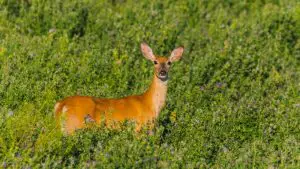Alfalfa is a type of forage that is often fed to deer in captivity. In the wild, however, deer are more likely to eat grasses, shrubs, and other plants. While alfalfa may be a part of a deer’s diet in some areas, it is not a common food source for these animals.
Alfalfa is a type of forage that is high in protein and fiber and is often used as animal feed. Deer are known to eat a variety of foods, so it’s not surprising that they would also eat alfalfa. Alfalfa is a good source of nutrition for deer, and they will often eat it when it is available.
Why You Should Feed Your Deer | Alfalfa for Big Bucks!
Do deer eat alfalfa in winter
Alfalfa is a type of forage crop that is grown specifically for grazing animals. It is a highly nutritious plant that is high in protein and fiber. Deer will often eat alfalfa during the winter months when other food sources are scarce.
Alfalfa is a good source of food for deer because it is high in calories and helps to keep them warm during the cold winter months.

Credit: www.gyt90.com
Is it bad to feed deer alfalfa in the winter?
A common question we receive at our store is “is it bad to feed deer alfalfa in the winter?” The answer to this question is no, it is not bad to feed deer alfalfa in the winter! In fact, alfalfa is a great source of nutrition for deer during the winter months.
Alfalfa is high in protein and fiber, which are both essential for deer during the winter months when food is scarce. The protein in alfalfa will help deer maintain their body temperature and the fiber will help them digest their food properly.
Alfalfa is also a good source of calcium, which is important for deer during the winter months as they are prone to developing bone problems such as Rickets.
So, if you are looking for a good source of food for your deer during the winter months, alfalfa is a great option!
How long will deer eat alfalfa?
If you’re interested in growing alfalfa to attract deer, you may be wondering how long they will actually eat it. The answer may surprise you – deer will eat alfalfa for as long as it is available!
Alfalfa is a highly nutritious forage crop that is beloved by deer (and other animals).
In fact, alfalfa is often referred to as “deer candy” because they love it so much. When alfalfa is in season, deer will eat it to their heart’s content.
Of course, once the alfalfa is gone, deer will move on to other food sources.
But if you’re looking to attract deer to your property and give them a nutritious meal, alfalfa is a great option.
Can you feed deer alfalfa bales?
Alfalfa is a nutritious forage crop that can be fed to deer. When alfalfa is cut for hay, it is usually cut before the plants flower. This results in a forage that is high in protein and digestible energy.
Deer love to eat alfalfa, and it can be a great way to supplement their diet, especially in the winter months when other forage is scarce.
Alfalfa bales can be fed to deer, but there are a few things to keep in mind. First, alfalfa is a very nutritious forage, and deer can easily become overweight if they eat too much of it.
Second, alfalfa bales can be difficult for deer to digest if they are not used to eating them. It is best to slowly introduce alfalfa into a deer’s diet, and to make sure that the bales are fresh and free of mold.
Do deer eat alfalfa pellets?
Alfalfa pellets are a type of livestock feed made from Alfalfa hay. They are a convenient and easy to store form of Alfalfa, and are often used as a supplemental feed for cattle, horses, and other livestock. Deer will eat Alfalfa pellets, but it is not their preferred food source.
Alfalfa is a high protein forage that is typically grown in areas with high rainfall and is irrigated. Deer will eat Alfalfa pellets when other forage is not available, but prefer to eat fresh green leaves, stems, and flowers of Alfalfa plants.
Conclusion
In short, yes, deer will eat alfalfa. If you have a farm or homestead, chances are you’ve considered planting alfalfa at some point. Alfalfa is a highly nutritious forage crop that can be used for hay, green chop, or silage.
It’s also a popular food source for deer.
Welcome to Zeke’s Blogging Adventures! Dive into expert insights on travel, camping, hunting, and fishing. Our team boasts expertise and experience. We hope you enjoy reading our blog Thanks for stopping by!

